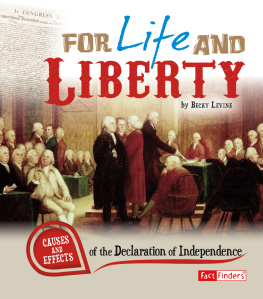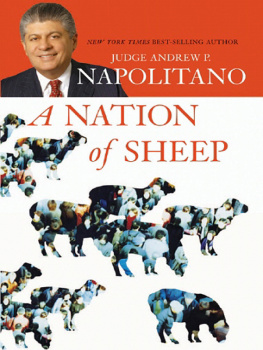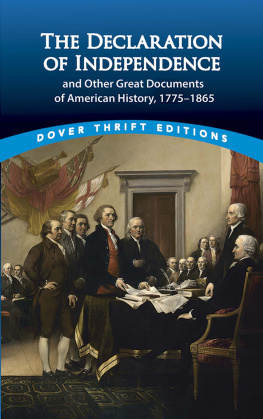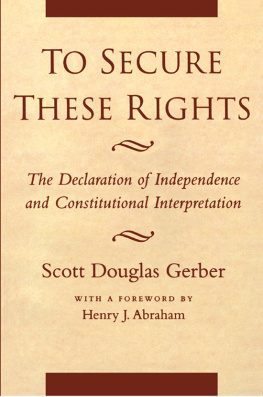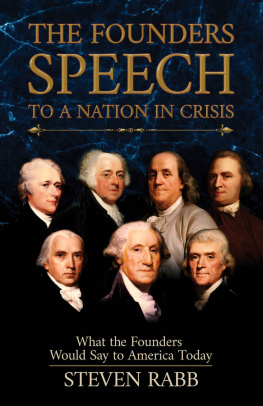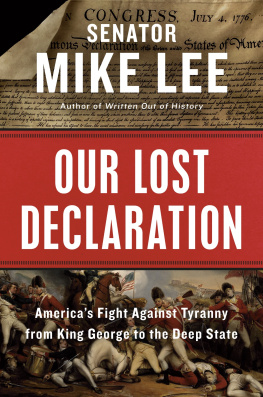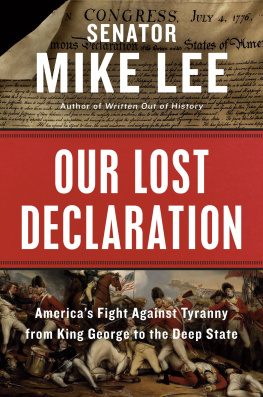Insights on Steven Rabb's The Founder's Speech to a Nation in Crisis
Insights from Chapter 1
#1
The American idea is not to make everyone equal, but to allow everyone to be what God made them. Liberty is the power to do everything that does not interfere with the rights of others.
#2
Liberty is the right to pursue happiness in your own manner. It is the freedom to do as you please, and it leaves everyone else the same right.
#3
The Declaration of Independence was the first solemn declaration, by a nation, of the only legitimate foundation of civil government. It was the cornerstone of a new fabric that covered the surface of the globe. It demolished at a stroke the lawfulness of all governments founded upon conquest.
Insights from Chapter 2
#1
The American Constitution guarantees freedom of religion, and yet, a paradox. No law should be passed that would establish a religion or prohibit the free exercise of it.
#2
The United States was built on the principles of liberty and justice, and these principles cannot be reversed. Men are not qualified for civil liberty in proportion to their appetite for moral chains.
#3
The United States has grown in wealth, power, and population unlike any other nation. But we have forgotten God. We have forgotten the gracious Hand that preserved us in peace and multiplied and enriched us. We have vainly imagined that all these blessings were produced by our own wisdom and virtue.
#4
The only foundation of a free Constitution is pure virtue, and if this cannot be inspired into the people in a greater measure than they have it now, then we may change our rulers and the forms of government, but we will not obtain a lasting liberty.
#5
Goodness is the essence of America. She is great because she is good, and if America ever ceases to be good, America will cease to be great.
#6
We should not be afraid of the people, but we should draw all powers from them into the hands of the elite. The people are most honest and trustworthy, and they should be used as such.
#7
We believe that the people are the sovereigns of the country, but they are sovereigns without subjects. Citizens of America are equal as fellow citizens, and as joint tenants in their sovereignty.
#8
The American people are exceptional because they make great sacrifices for the public good. They live in a society, and they constantly remind others that it is their duty to be useful to their fellow creatures.
#9
The Declaration of Independence is the most valuable inheritance that a nation can give to its people. It is the signal that awakens men to burst the chains of monkish ignorance and superstition and to assume the blessings and security of self-government.
Insights from Chapter 3
#1
The early Adventurers had a complete disregard for all hereditary indefeasible right and the divine miraculous origin of government. They knew that government was a simple and clear thing founded in nature and reason, and they detested all the base services and dependencies of the feudal system.
#2
To those who would usurp the sovereignty of the people, the fundamental source of all your errors, sophisms, and false reasonings, is a total ignorance of the natural rights of mankind. You would be convinced that natural liberty is a gift of the beneficent Creator to the whole human race, and that civil liberty is founded in that and cannot be wrested from any people without the most manifest violation of justice.
#3
If we the people want to be our own governors, we must arm ourselves with the power that knowledge gives us. We must read, think, speak, and write. We must become attentive to the grounds and principles of government, and study the law of nature, the spirit of the Constitution, and the histories of ancient times.
#4
Education is not attained by chance. It must be sought for with ardor and attended to with diligence. It will expand your powers of mind and prompt you to search for truth in every subject that interests you.
#5
1 The United States is a country where the First Amendment protects our right to think what we like and say what we please. And if we are to govern ourselves, we must have these rights, even if they are misused by a minority. 2 Absolute monarchy was the universal form of government in the earliest ages of the world. Rulers ruled through fear, and there were no citizens, only subjects beholden to the ruler.
#6
The absence of discussion leads people to forget not only the grounds for an opinion, but also its meaning. The words in which it is expressed cease to suggest ideas or only a small portion of the ideas they were originally used to communicate.
#7
Without freedom of speech, there can be no such thing as liberty. And without liberty, the brain is a dungeon where chained thoughts die. Without freedom of thought, there can be no wisdom.
#8
The media has become completely corrupt. Truth no longer exists in that polluted vehicle. The real extent of this state of misinformation is only known by those who are in positions to confront facts with the lies of the day.
Insights from Chapter 4
#1
The American Revolution was a revolution of charters. America had set the example of charters of power granted by liberty. The revolution in the practice of the world may be pronounced the most triumphant epoch in history.
#2
The problem with democracy is that it allows the majority to rule over the minority. In other words, it is mob rule. In general, such democracies have been violent and short-lived.
#3
The purpose of the Constitution is to restrict the majoritys ability to harm a minority. The 10th Amendment reserves all remaining powers to the states and the people.
#4
The Great Compromise created a House of Representatives elected by the popular vote, and a Senate that provided equal representation through the election of two Senators for each state. The electoral college was created to respect the interests of all the states in the selection of a President.
#5
Upon ratification of the Constitution, Article II vested powers in the executive branch, in President George Washington.
#6
The most important thing in the grand experiment of America is not the election of the first President, but the election of its second President. For the peaceful transition of power is what will separate this country from every other country in the world.
#7
The Founding Fathers, with a sublime faith in the great principles of justice and freedom, laid deep the cornerstone of the national super-structure, which rises in grandeur around you.
#8
The American people were unalterably resolved to be free, and they would be not only adequately informed but ever alert and vigorously active in forestalling and combating any threats to individual liberty.
Insights from Chapter 5
#1
The American Revolution was sparked by the British enforcement of trade laws against local merchants. The writs would provide legal authority for officials to conduct forcible searches of private property.
#2
While democracy extends the sphere of individual freedom, socialism restricts it. As democracy attaches all possible value to each man, socialism makes each man a mere agent, a number. As the conditions of men become equal among a people, individuals seem less important.
#3
The American Constitution was created to protect the people from the dangers of good intentions. The nation was tired of its representatives and of itself, and either created freer institutions or returned to a single master.
#4
Americans have the right and advantage of being armed, unlike the citizens of other countries whose governments are afraid to trust them with arms.


